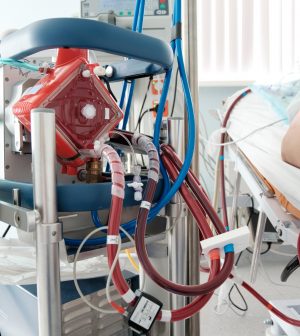- Could Your Grocery Store Meat Be Causing Recurring UTIs?
- Are You Making This Expensive Thermostat Error This Winter?
- Recognizing the Signs of Hypothyroidism
- 10 Strategies to Overcome Insomnia
- Could Artificial Sweeteners Be Aging the Brain Faster?
- Techniques for Soothing Your Nervous System
- Does the Water in Your House Smell Funny? Here’s Why
- Can a Daily Dose of Apple Cider Vinegar Actually Aid Weight Loss?
- 6 Health Beverages That Can Actually Spike Your Blood Sugar
- Treatment Options for Social Anxiety Disorder
ECMO Breathing Support Safe, Effective for Obese Patients in Respiratory Failure

Using ECMO, a highly advanced form of breathing support, does not appear to complicate treatment for obese adults in intensive care.
ECMO, which is short for extracorporeal membrane oxygenation, may even help these patients when they experience respiratory failure, despite the fact that its use has been questioned for those with obesity.
Obese patients who received ECMO for acute respiratory distress syndrome (ARDS) had lower death rates compared to patients with ARDS who received ECMO and were not obese, according to the study funded by the U.S. National Institutes of Health (NIH).
To come to that conclusion, the researchers reviewed data from 790 patients from more than 20 medical centers across 10 countries who received ECMO for ARDS.
In all, 320 of these patients were obese. The study found 24% of patients with obesity died in the intensive care unit, compared to 35% of patients who weren’t obese.
Although the authors couldn’t control for all variables, including disease severity, they concluded the findings support the concept that obesity shouldn’t factor into treatment decisions for ECMO.
“We hope that clinicians will consider the data from this study when making bedside decisions for ARDS patients with obesity, instead of preemptively withholding this lifesaving therapy,” study author Dr. Darya Rudym, a pulmonologist and assistant professor of medicine at NYU Langone Health in New York City, said in an NIH news release.
That was in line with previous studies that have found similar findings looking at data from patient registries and observational reviews.
ARDS accounts for roughly 10% of intensive care unit admissions worldwide.
Pneumonia was the most common factor leading to the severe respiratory illness seen in this study.
Survival rates for ARDS vary, with about half to three-fourths of patients surviving. Survival rates for ECMO, which is considered a last-resort treatment, are also variable, but have ranged from about 60% to 75%.
The study, which was published recently in the American Journal of Respiratory and Critical Care Medicine, was partially supported by the U.S. National Heart, Lung, and Blood Institute (NHLBI) and the U.S. National Center for Advancing Translational Sciences.
More information
The American Thoracic Society has more on ECMO.
SOURCE: U.S. National Institutes of Health, news release, Aug. 28, 2023
Source: HealthDay
Copyright © 2026 HealthDay. All rights reserved.










